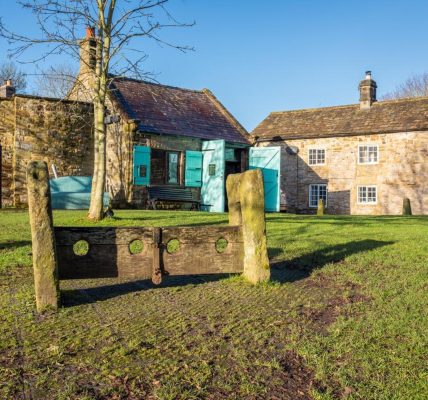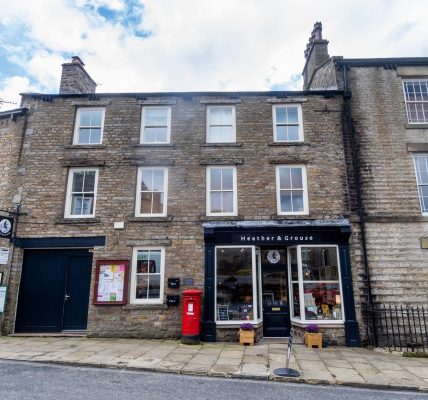Maurice Lee on life in Leeds in the 60s, the Grumbleweeds and superfan Roy Orbison
Back in their heyday, the Grumbleweeds had quite a following.
The award-winning comedy band were so popular they even had their own fan club, which included one very famous member… a certain Roy Orbison.
“We were doing a show in Weston-super-Mare where he’d just finished a week-long run,” says Maurice “Grumbleweed” Lee. “We were on that night and he stayed behind to watch the show.
“We used to do an impression of him. Albert would be singing Dream Baby and he’d take one pair of glasses off and he’d have another pair on underneath. Roy Orbison saw this and fell on the floor laughing. We met him afterwards and he was great and he joined the Grumbleweeds fan club. So the people who ran it actually sent fan letters to him in Tennessee.”
The Grumbleweeds rose to prominence in the 1970s along with variety shows like The Wheeltappers and Shunters Social Club, and reached their zenith in the following decade thanks to their popular radio and TV shows.
Maurice was a guitarist, drummer and vocalist with the band from its inception in 1962 until he left in the late 90s.
He was born in the Burley area of Leeds and his interest in music dates back to when his uncle bought him a Hawk acoustic guitar when he was nine years old. “It made a change from a cricket bat, which is what I used to strum in front of the mirror.”
A few years later he and Robin Colvill formed a band in Leeds and were later joined by Graham Walker and Carl and Albert Sutcliffe, and so the Grumbleweeds were born.
In the early days they played in pubs like the US Hussars and the Slip Inn where their music frequently provided the soundtrack to a late- night brawl.
“We’d play at the US Hussars which is where all the workmen would go after they’d finished work. There’d be fellas in the first row with scaffolding belts on and big boots and we’d be playing Beatles covers. At the Prospect on York Road we’d do four nights and there was always a fight, but that’s just the way it went. It didn’t matter where you played – we did a gig at Armley Baths – there was always a battle.”
At the time Maurice worked as a draughtsman and moonlighted with the band after dark. Initially they were a covers band and in 1963 they took part in a Best Group in US Competition at Queens Hall in Leeds in front of 2,000 people.
“There were 70 bands playing and we came third even though we only knew three numbers at the time – Johnny B. Goode, Pipeline by the Ventures and an instrumental called Grumbleweed. If we’d had to do an encore we didn’t have another song.”
On the back of this they were invited to do a stint at the Top Ten club in Hamburg, following in the Beatles’ footsteps. “Their contract was on the wall and we slept in the same beds they had,” Maurice recalls.
However, they lost their equipment and had to return home. But sometimes opportunity springs from misfortune. “We started doing the working men’s clubs and because we’d lost our own gear we started messing about and the messing about actually got some laughs so we started bringing impressions, things like Steptoe and Son, into our act.”
Buoyed by this, they morphed into more of a variety act with a blend of music, jokes and impressions. In 1967 they appeared on Opportunity Knocks, turned professional and soon started to make a name for themselves on the popular summer shows circuit.
They became a big draw playing venues like the London Palladium and Batley Variety Club, which back then was in its pomp. “We’d be on one week and Roy Orison or Shirley Bassey would be on the following week. We were a local act and we didn’t get the same bread as Shirley Bassey but we filled the venue and we’d play ten times a year,” says Maurice.
They were playing at Batley Variety Club when they were talent spotted by a BBC radio producer and given their own series – The Grumbleweeds Radio Show – which ran for almost a decade during the 80s. Granada then gave them their own TV show which proved equally popular.
“We were the Saturday night Ant and Dec except there were five of us. It was good fun and we were probably the only band in the country that had their own television series on a Saturday evening.”
The band members became household names. “I once rang up directory enquiries and a woman on the other end said: ‘Is that Maurice from the Grumbleweeds?’ because I had such a recognisable voice.”
In 1998, though, Maurice decided it was time to leave. “It sounds boastful but we’d done everything that I felt we could do, and I thought the only thing that would happen is I’d spiral back to where I started from and I didn’t really want to do that.”
He and his wife Jill moved to Hawes where they opened an art gallery called Simply Original, which sold some of his artwork. “All the time I’ve been on the road I’ve tried to find time to paint, it’s always been a helpful distraction. So when I was touring with the Weeds or doing a summer show it meant I could sketch and watercolour.”
His showbiz career hadn’t quite finished. He was asked to create a one-man show to take on the cruise ships and 20 years later he’s still doing it. His solo act has taken him to places like Antigua, Venice and Dubrovnik – some of which feature in his new watercolour book, World Watching.
Coronavirus brought all this to an abrupt halt and has meant he has spent the past 12 months at home in Menston with his family. “I’ve been in transit for most of my life but last year it all changed. I’ve been married 52 years and me and Jill have been together more than we ever have, so we’ve been very lucky.”
Maurice looks back on his career with fondness and a sense of pride. “Music and comedy go together really well. The Grumbleweeds had a mixture of different people.
“You had Graham, who was naturally funny; you had Robin who was an impressionist and very clever; you had Albert who could do Elvis and Roy Orbison impressions; you had Carl who could play the keyboards; and myself who could play the guitar and the drums and do some Bee Gees impressions.
“You put all that together with a bit of slapstick comedy and it was something the whole family could enjoy.”
He’s now pensioner and grandfather but hasn’t lost that creative urge. As well as his latest book, he has produced a new album, One Door Closes, and has other projects in mind.
“When you write songs or paint you’re always thinking about what you can do next, so I’ve not been wasting my time.”










